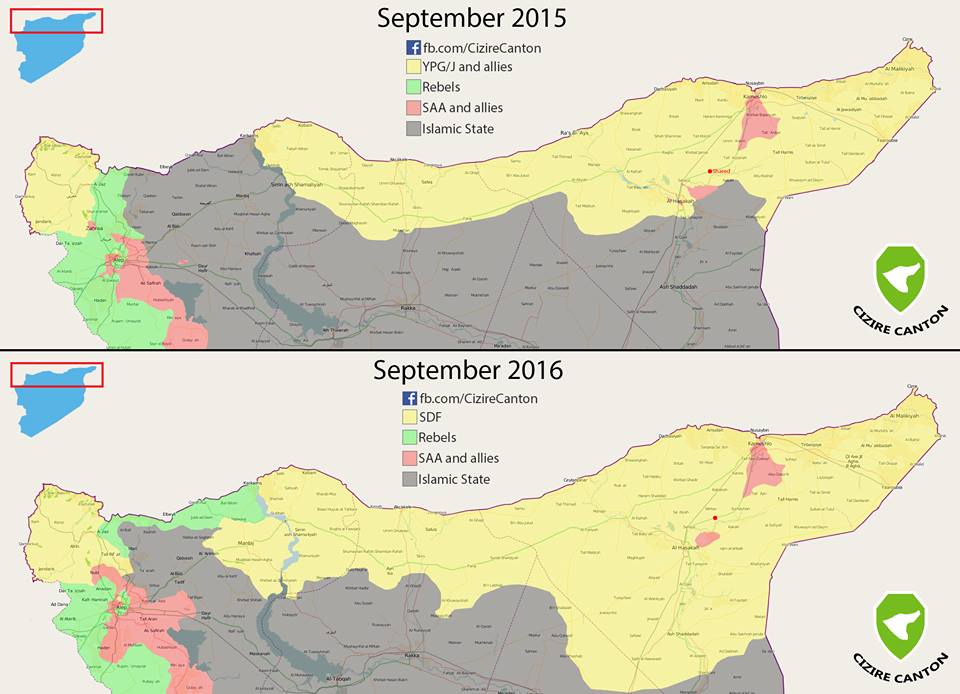Main menu
You are here
Syria Update: Aleppo, Hama and Shirqat (Iraq)
SYRIA UPDATE: After breaking the cease fire, Russia and the regime carried out a massive series of airstrikes on rebel-held east Aleppo, killing hundreds of civilians and cutting water to the entire city. They then launched a ground offensive from the north, lead by the regime-aligned Palestinian militia, Liwa al-Quds, which was able to seize some territory. Somewhat astonishingly, though, the rebels were able to push them back, inflicting heavy losses and retaking the lost territory. We'll have to see how long the rebels can keep that up, though, since they're reported to be very low on ammunition, and they're not going to be receiving any airdropped supplies from the US (like they would if they were the Kurds).
Elsewhere, the rebels have had a surprising amount of success with their push south toward Hama. Hama was one of the cities where the rebellion began, and the regime is widely loathed there, but it was recaptured by Assad a few years ago. The city's main defenses are the strong points at Maan (which just fell to the rebels), Hamra (where the Syrian Army's Brigade 66 is based), Hama Airport (the regime's main airbase in northern Syria), a few mountains for fire control, and the city itself, which is guarded by the regime's NDF militia (which is supposed to be pretty good, but which is also probably better at counterinsurgency warfare than conventional warfare). The rebels are currently in a position where they can exert some fire control over the airport, and were able to destroy a fighter jet on the ground during today's bombardment. I think the regime only has about twenty planes left.
The specific groups involved in the Hama offensive are the regular basket of deplorables in the north -- mostly generic Islamists and hardline Salafists. This is consistent with the overall decline of the moderate FSA as a major contributor to the fight against Assad.
The regime also appears to be preparing for an offensive on the Southern Front, which is moderate and Democratic and has a lot of fighters, but which is also very disorganized and hasn't seen any serious fighting in a long time. It's unlikely that the Southern Front will be able to put up much of a fight.
The Kurds, as you will recall, control two areas in the north: a vast region centered around Kobane, Hasakah, and Qamishli in the east, and a much smaller region around Afrin in the east. Their longstanding goal has been to connect these two territories (which would give them control over almost the entire Turkish border), and to this end, the captured the city of Manbij from ISIS. Further attempts to expand into ISIS's territory from the east were prevented by a Turkish invasion, which ended when those Kurds agreed not to bite off any more territory. The Kurds in Afrin, however, are under no such obligations, and have been waging a slow campaign to push toward Al-Bab, which is the final city separating the two Kurdish groups. Turkey's FSA proxies have been dicking around to the north of al-Bab instead of doing anything useful, so it's not impossible that the Kurds will still manage to snag the city, especially if they manage to take the mountains to the west. I very much doubt that Turkey would just sit there and watch that happen, though.

In Iraq, the army finally took Shirqat, and is clearing out the surrounding villages. Once they're done, they'll be in complete control of Salah ad-Din governate, directly south of Mosul. ISIS still controls the area around Hawija, though, so the supply line between Baghdad and Mosul still isn't completely secure. It's probably close enough, though. Once the army takes the remaining ISIS positions west of the Euphrates, there won't be anything stopping them militarily from pushing north to assault the heavily defended highlands south of Mosul. Politically, of course, it's a different story. I'm pretty sure they're still trying to figure out exactly what they're going to do with Mosul once they capture it.
- marshall.lewis's blog
- Log in to post comments